Local
Vigil for slain transgender woman draws over 200
Father makes appeal for witnesses to help police ‘bring killer to justice’
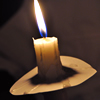
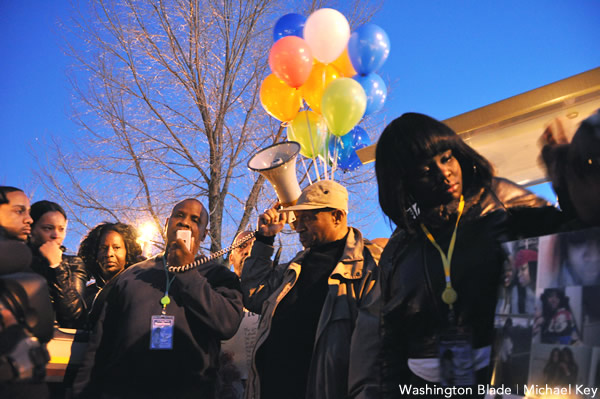
Over 200 people attended a candlelight vigil held for murdered trans woman Deoni Jones. (Washington Blade photo by Michael Key)
More than 200 people turned out for a candlelight vigil Tuesday night at the site of a Northeast Washington bus stop where transgender woman Deoni Jones, 23, was fatally stabbed on Feb. 2 while waiting for a bus.
Surrounded by family members and friends, Jones’ stepfather, Alvin Bethea, made an emotional appeal for witnesses to come forward to identify a male suspect that police believe stabbed Jones in the face about 8:15 p.m. at the bus stop at East Capitol Street and Sycamore Road, N.E.
“We suspect that the person who did this lives in this community or hangs out in this community,” Bethea said. “Help the Metropolitan Police Department out… If anybody knows anything, please contact them.”
Bethea and other family members and friends who spoke at the vigil through a bullhorn provided by a member of the police department’s Gay & Lesbian Liaison Unit described Jones as warm and considerate, saying she lifted their spirits and made them laugh.
Police said this week that a video they released last Friday showing the suspect crossing a street from a distance prompted several people to contact investigators with information that is helping the department’s Homicide Branch in its investigation of the murder.
The video, which has been posted on YouTube, doesn’t clearly show the suspect’s face. But police said they were hopeful that someone who knows the person in question would recognize him in the video and reveal his identity to police homicide investigators.
In an interview with the Blade on the day police released the video, Lt. Robert Adler of the Homicide Branch described the suspect as a black male, 30 to 40 years old, about five-feet-nine to six-feet tall, with a medium build and medium complexion and sporting a beard.
“At the time of the incident the person was wearing a black jacket with a grey hooded sweatshirt underneath it and a pair of what we believe is jeans,” Adler said.
He said investigators obtained the description of the suspect “from a variety of different sources.”
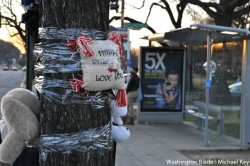
A makeshift memorial for Deoni Jones has been set up by loved ones at the bus stop where her murder took place. (Washington Blade photo by Michael Key)
Asked whether evidence exists to indicate the killing was a hate crime, Adler said, “At this time we are still investigating if it is or is not a hate crime. And as the investigation proceeds we should probably get a better idea of whether that was a factor in the assault.”
Police issued a statement on Feb. 3 saying a citizen flagged down a Metro transit police officer about 8:15 p.m. on Feb. 2 to report an assault at a bus stop on the 4900 block of East Capitol Street, N.E.
“Upon arrival, the officer located a transgender female who was unconscious and unresponsive suffering from a stab wound,” the statement said. “Units from the Sixth District and D.C. Fire and Emergency Medical Services personnel responded to the scene. The victim was transported to a local hospital and admitted in critical condition,” the statement said.
“On Friday, Feb. 3, 2012, at 2:35 a.m., the victim was pronounced dead,” the statement said.
Adler said Jones had no identification in her possession when police found her unconscious at the bus stop. He said investigators later identified her through finger prints.
The D.C. Trans Coalition released a statement on Feb. 3 saying it had learned through its own sources that a third person was at the bus stop when the stabbing took place and chased after the attacker. The statement said the attacker escaped when the witness realized that Jones was in need of immediate medical attention and abandoned his pursuit of the attacker.
Among those speaking at the vigil on Tuesday were Jeffrey Richardson, director of Mayor Vincent Gray’s Office of GLBT Affairs; Earline Budd and Brian Watson, officials with the D.C. transgender advocacy and services organization Transgender Health Empowerment; Cyndee Clay, executive director of the local group HIPS, which provides social services to transgender people; Officer Justin Markiewicz of the GLLU; and Ron Moten, co-founder of the D.C. youth anti-violence group Peaceoholics.
Jones’ mother, Jaquander Jones, and sister Judean Jones told the gathering they were devastated over the murder and were struggling over why someone would take the life of their loved one.
Moten urged possible witnesses to Jones’ murder to disregard what he called a reluctance by many city youth to turn in violent criminals out of fear of being labeled a “snitcher.”
“Somebody saw what happened,” he said. “And let me tell you something. There’s a difference between snitching and citizenship. Snitching is when you commit a crime with somebody and then you tell on them so you can get off,” he said.
“Citizenship is when you protect and serve your community and you fight for people like Deoni who lived a good life, who helped people, who made people smile every day,” he told the gathering.
One male friend of Jones,’ who didn’t identify himself at the vigil, described her as one of his closest friends and said her death has been devastating for him.
“This is a person who I hung out with like every day,” he said. “I watched this girl graduate. I helped her with her homework. I watched her grow from JaParker to Deoni, and that was a big step for her,” he said.
“If you’re going to do that you have to be a brave person,” the friend said. “She said she was ready. And that’s what she did, she just transformed. She was so beautiful.”
Some at the vigil, such as Bethea, referred to Deoni by her birth name of JaParker or by her nickname Logan. All who spoke said they loved and respected her for who she was.
In his emotional appeal for witnesses to come forward, Bethea described how he interacted with Jones at their home minutes before her death.
“I was sitting in the house just surfing the Internet on the laptop when JaParker asked to check the bus schedule to see what time the bus was going to arrive at this stop here,” he said. “I turned the laptop so he could check it. He checked it and walked out the door to hang out with one of the friends that he grew up with,” Bethea said.
“Ever since JaParker came into my life about 18 years ago he brought nothing but joy,” he said. “That’s all he ever did.”
In speculating on why the suspect attacked Jones, Bethea said he was certain that Jones would not have started a confrontation.
“I don’t know exactly whether they exchanged words or what but JaParker didn’t have a violent bone in his body,” he said. “And he was just confronted by the devil. He was simply sitting at this bus stop. That’s all.”
Police are offering a reward of up to $25,000 to anyone providing information leading to the arrest and conviction of the person or persons wanted for any homicide committee in D.C., police said in a statement.
Anyone with information is asked to call police at 202-272-9099. Anonymous information can be submitted to the department’s “TEXT TIP LINE” by text messaging 50411, the police statement says.
District of Columbia
Imperial Court of Washington drag group has ‘dissolved’
Board president cites declining support since pandemic
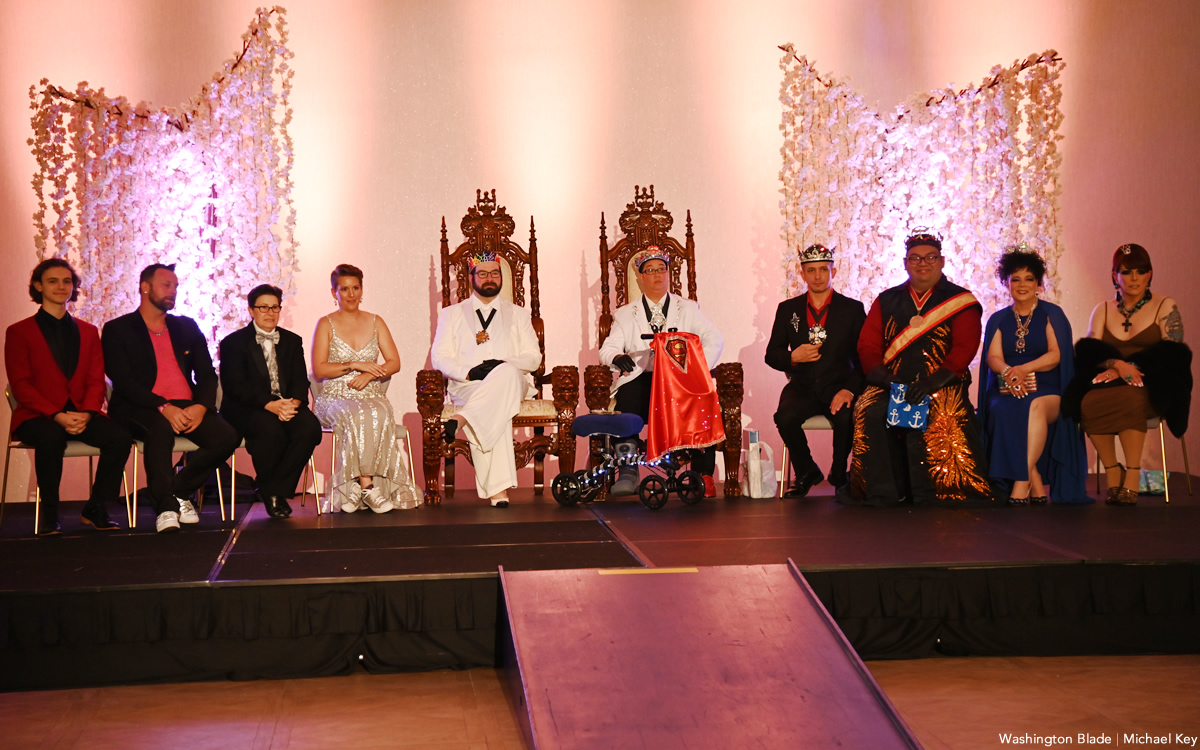
The Imperial Court of Washington, a D.C.-based organization of drag performers that has raised at least $250,000 or more for local LGBTQ and non-LGBTQ charitable groups since its founding in 2010, announced on Jan. 5 that it has ended its operations by dissolving its corporate status.
In a Jan. 5 statement posted on Facebook, Robert Amos, president of the group’s board of directors, said the board voted that day to formally dissolve the organization in accordance with its bylaws.
“This decision was made after careful consideration and was based on several factors, including ongoing challenges in adhering to the bylaws, maintaining compliance with 501(c)(3) requirements, continued lack of member interest and attendance, and a lack of community involvement and support as well,” Amos said in his statement.
He told the Washington Blade in a Jan. 6 telephone interview that the group was no longer in compliance with its bylaws, which require at least six board members, when the number of board members declined to just four. He noted that the lack of compliance with its bylaws also violated the requirements of its IRS status as a nonprofit, tax-exempt 501(c) (3) organization.
According to Amos, the inability to recruit additional board members came at a time when the organization was continuing to encounter a sharp drop in support from the community since the start of the COVID pandemic around 2020 and 2021.
Amos and longtime Imperial Court of Washington member and organizer Richard Legg, who uses the drag name Destiny B. Childs, said in the years since its founding, the group’s drag show fundraising events have often been attended by 150 or more people. They said the events have been held in LGBTQ bars, including Freddie’s Beach Bar in Arlington, as well as in other venues such as theaters and ballrooms.
Among the organizations receiving financial support from Imperial Court of Washington have been SMYAL, PFLAG, Whitman-Walker Health’s Walk to End HIV, Capital Pride Alliance, the DC LGBT Community Center, and the LGBTQ Fallen Heroes Fund. Other groups receiving support included Pets with Disabilities, the Epilepsy Foundation of Washington, and Grandma’s House.
The Imperial Court of Washington’s website, which was still online as of Jan. 6, says the D.C. group has been a proud member of the International Court System, which was founded in San Francisco in 1965 as a drag performance organization that evolved into a charitable fundraising operation with dozens of affiliated “Imperial Court” groups like the one in D.C.
Amos, who uses the drag name Veronica Blake, said he has heard that Imperial Court groups in other cities including Richmond and New York City, have experienced similar drops in support and attendance in the past year or two. He said the D.C. group’s events in the latter part of 2025 attracted 12 or fewer people, a development that has prevented it from sustaining its operations financially.
He said the membership, which helped support it financially through membership dues, has declined in recent years from close to 100 to its current membership of 21.
“There’s a lot of good we have done for the groups we supported, for the charities, and the gay community here,” Amos said. “It is just sad that we’ve had to do this, mainly because of the lack of interest and everything going on in the world and the national scene.”
Virginia
LGBTQ groups to join Spanberger inaugural parade
Virginia Pride among more than 25 orgs to march in Jan.17 event
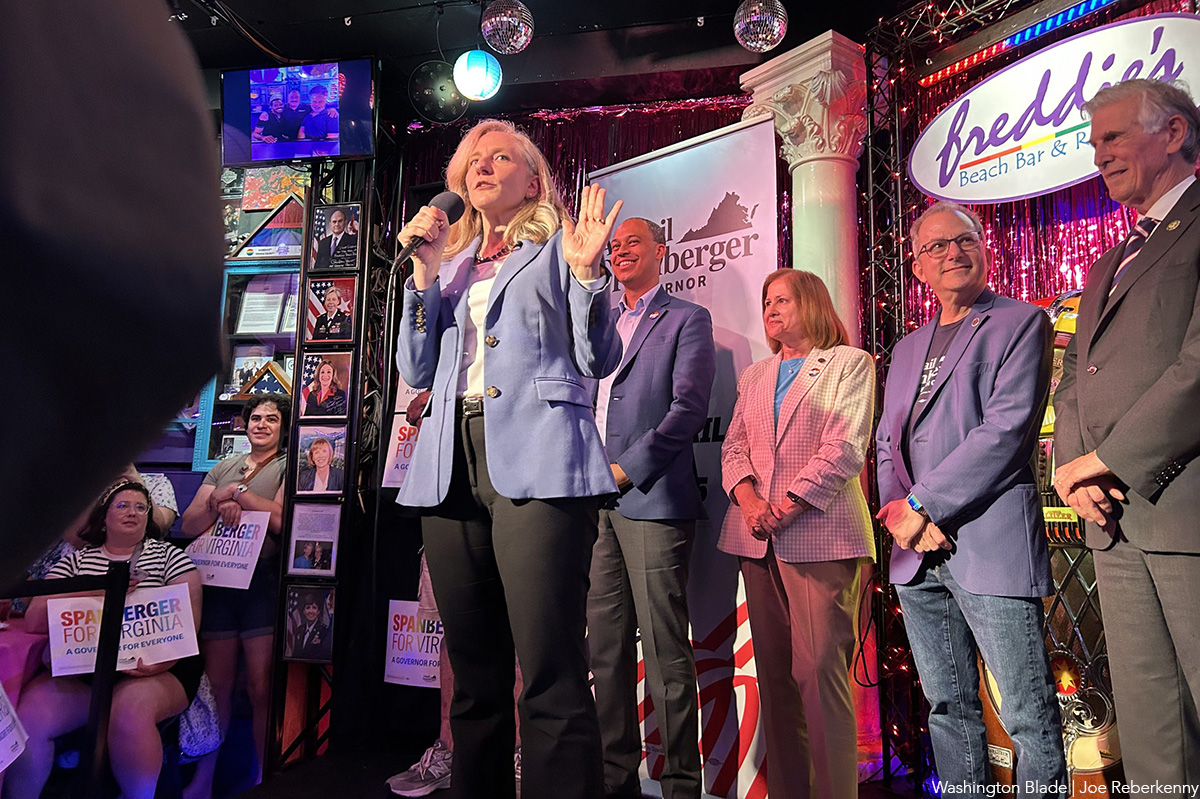
Virginia Gov.-Elect Abigail Spanberger’s inaugural committee announced on Jan. 2 that at least two LGBTQ organizations will be among more than 25 state-based organizations, including marching bands, that will participate in her inaugural parade on Jan. 17.
A statement released by the inaugural committee says the parade will take place immediately after Spanberger is sworn in as Virginia’s 75th governor and delivers her inaugural address in Richmond.
The statement lists the LGBTQ groups Virginia Pride and Diversity Richmond as two groups participating in the parade, although the two groups merged in 2021, with Virginia Pride becoming a project of Diversity Richmond. Among other things, Virginia Pride organizes Richmond’s annual LGBTQ Pride events.
“A display of the impressive talent and beauty of every corner of Virginia, our inaugural parade will be a celebration of all that makes our Commonwealth strong,” Spanberger said in the Jan. 2 statement. “I’m excited for attendees in the stands on Capitol Square and families watching together at home to see this incredible showing of Virginia pride,” she said.
James Millner, who serves as director of Virginia Pride, told the Washington Blade about 75 people are expected to join the Virginia Pride-Diversity Richmond contingent in the parade. He said among them will be members of other Virginia LGBTQ organizations.
“We’re going to invite our staff, our board, our volunteers, and our community partners to join us,” Millner said.
“We are thrilled and honored to have been invited to participate in Abigail Spanberger’s inauguration festivities,” he added. “I think this represents a marked change from the previous administration and demonstrates what she campaigned on – which is she sees the diversity of the Commonwealth as a strength that needs to be celebrated,” he said. “And we are very happy that she has invited us to represent the diversity of the commonwealth.”
Millner appeared to reflect on the sentiment of the large majority of Virginia’s LGBTQ community in its support for Democrat Spanberger over Republican Lt. Gov. Winsome Earle-Sears in the November 2025 Virginia election and the end of incumbent GOP Gov. Glenn Youngkin’s term in office on Jan. 17.
“After what we’ve been through with the Younkin administration, especially in its treatment of LGBTQ folks, especially transgender and nonconforming folks, I think we are all breathing easy and excited about what opportunities will exist in working with Abigail Spanberger,” he told the Blade.
District of Columbia
Two pioneering gay journalists to speak at Thursday event
Blade’s Chibbaro, Falls Church News-Press’s Benton talk long careers
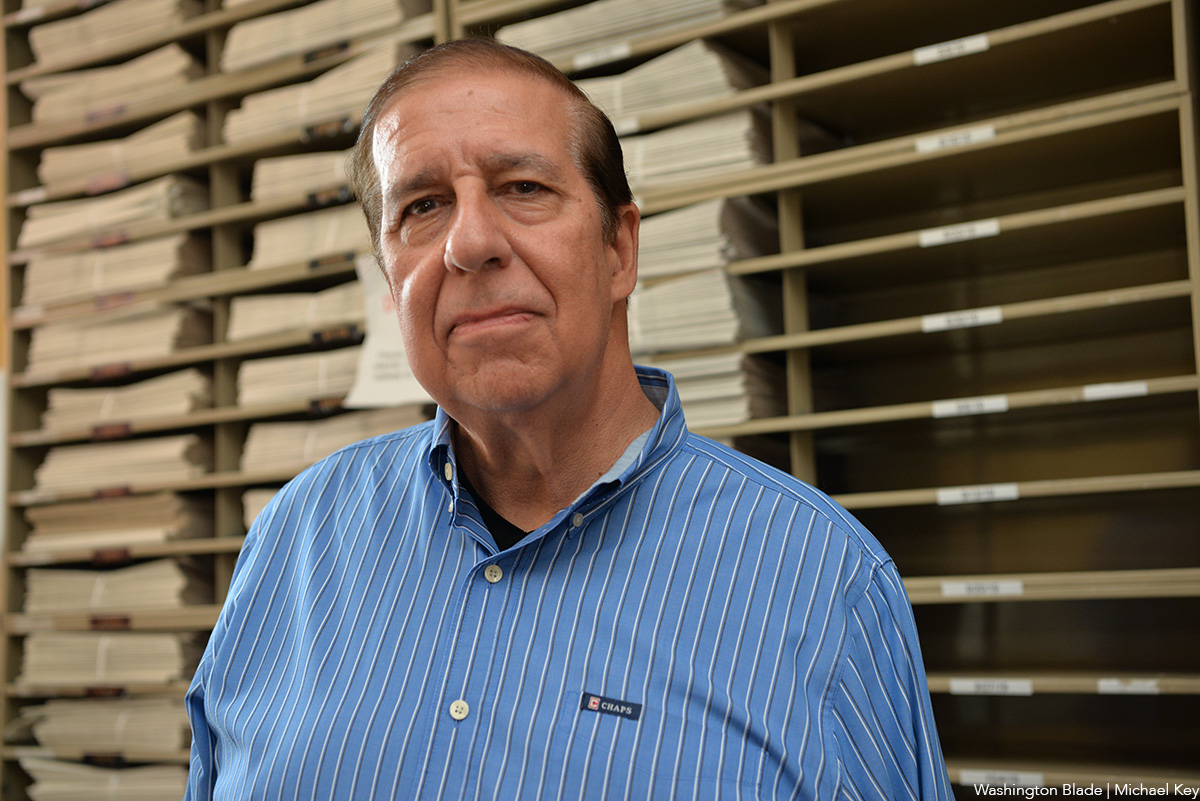
Two local gay journalists will speak on a panel this week about their long, pioneering careers.
A celebration of the Falls Church News-Press’s Nicholas Benton and the Washington Blade’s Lou Chibbaro Jr., two trailblazing LGBTQ journalists who have spent decades reporting on the front lines of social, cultural, legal, and political change in America, will be held this Thursday, Jan. 8, at the Women’s National Democratic Club of Washington. D.C., 1526 New Hampshire Avenue, N.W., at 6 p.m., according to a statement from organizers.
The program will explore their journeys, the evolution of LGBTQ journalism, and the ongoing fight for equality and justice. Benton and Chibbaro will also examine the various factors causing many news outlets to cease print publication and their energetic efforts to continue publishing their work both in print and online.
EVENT DETAILS:
- Remarks and Q&A, in-person and via Zoom.
- 6 p.m. complimentary hors d’oeuvres and cash bar; 6:30–7:30 p.m. program followed by book signing.
- Zoom only: $10. In-person: members: $20, nonmembers: $30 plus tax.
Benton’s latest book, “Please Don’t Eat Your Children, Cult Century, and Other Essays,” will be available for purchase at the event.
Benton is a longtime local journalist and LGBTQ rights activist whose work has had a lasting impact on both community journalism and social justice. Author of the first-ever editorial in the pioneering Gay Sunshine newspaper in 1970, he is best known as the founder, owner, and editor of the Falls Church News-Press, an independent weekly newspaper he launched in 1991 and is the paper of record for the City of Falls Church, Virginia.
Chibbaro is the senior news reporter for the Washington Blade and a pioneering journalist in LGBTQ news coverage. He has reported on the LGBTQ rights movement and community continuously since 1976, first as a freelance writer and later as a staff reporter, joining the Blade in 1984.

















